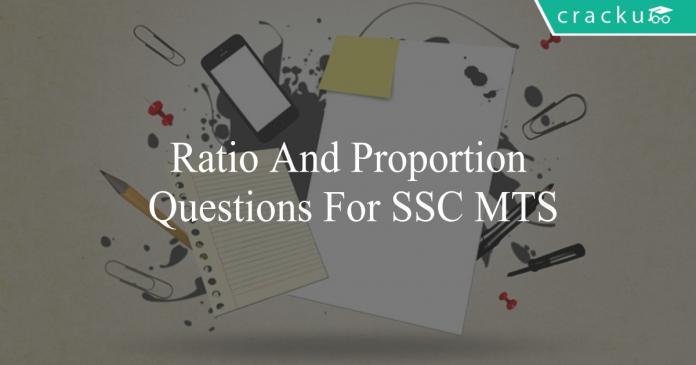Ratio And Proportion Questions For SSC MTS
Download Top-20 SSC MTS Ratio and Proportion Questions PDF. Ration and Proportion questions based on asked questions in previous year exam papers very important for the SSC MTS exam.
Download Ratio And Proportion Questions For SSC MTS
Last Day – 10 SSC MTS Mocks for just Rs. 117
Take a free mock test for SSC MTS
SSC MTS Previous Papers (Download PDF)
Question 1: The ratio of two numbers is 5 : 4. If the sum of both the numbers is 180, then what is the smaller number among both the numbers?
a) 100
b) 80
c) 60
d) 75
Question 2: Rs 6300 is divided among A, B and C in the ratio of 1/2: 1: 3/5. What is the share (in Rs) of B?
a) 3300
b) 2700
c) 3000
d) 4200
Question 3: S, T and U together can complete a work in 30 days. If the ratio of efficiency of S, T and U is 20: 15: 12 respectively, then in how many days U alone can complete the same work?
a) 195/2
b) 235/2
c) 225/2
d) 215/2
Question 4: In what ratio must a mixture of 20% milk strength be mixed with that of 60% milk strength so as to get a new mixture of 25% milk strength ?
a) 7: 1
b) 4: 1
c) 5: 2
d) 9: 2
Question 5: Rs 18200 is divided among X, Y and Z in the ratio of 1/3: 1/4: 1/2. What is the share (in Rs) of X ?
a) 7000
b) 4400
c) 4200
d) 5600
Take a free mock test for SSC MTS
Question 6: The ratio of milk and water in three samples is 1: 3, 3: 5 and 11: 5. A mixture containing equal quantities of all three samples is made. What will be the ratio of milk and water in the new mixture?
a) 7: 9
b) 5: 7
c) 15: 13
d) 9: 11
Question 7: Of three positive numbers, the ratio of first and second is 5: 2, ratio of second and third is 5: 4. The product of first and third is 1800. What is the sum of the three numbers?
a) 43
b) 133
c) 119
d) 129
Question 8: Two whole numbers are such that the square of first number exceeds the second by 112 and the ratio of the numbers is 4:3. What is the value of smaller number?
a) 3
b) 4
c) 12
d) 36
Question 9: The sum of three numbers is 162. If the ratio of the first number to the second number is 5: 7 and that of the second number to the third number is 5: 3, then what is the second number?
a) 35
b) 70
c) 80
d) 40
Question 10: The milk and water in two vessels are in the ratio of 3: 1 and 7: 11 respectively. In what ratio should the liquid in both the vessels be mixed to obtain a new mixture containing half milk and half water?
a) 5:7
b) 4:9
c) 1:1
d) 4:7
SSC Study Material (18000 Solved Questions)
General Science Notes for SSC Exams
Question 11: The ratio of three numbers is 5: 6: 8. If the sum of the three numbers is 380, then
what is the smallest among the three numbers?
a) 75
b) 80
c) 120
d) 100
Question 12: If in the population of a town there is an increase of 44% in the first year and 75% in the second year, then what is the average rate of increase in the population?
a) 45%
b) 59.5%
c) 74%
d) 76%
Question 13: In a mixture of milk and water, there is 19% milk. If the quantity of milk in the mixture is 437 mililitres, then what is the total quantity (in millilitres) of mixture?
a) 2300
b) 2200
c) 2350
d) 2400
Question 14: The ratio of two numbers is 6 : 11 and their difference is 65. What will be the smaller number among both the numbers?
a) 58
b) 65
c) 52
d) 78
Question 15: If 35% of (x + y) = 40% of (x – y), then x is what percentage of y?
a) 1500
b) 150
c) 15
d) 105
Question 16: The ratio of three numbers is 2 : 3 : 5. If the sum of the three numbers is 275, then what is the largest among the three numbers?
a) 142
b) 82.5
c) 137.5
d) 152
Question 17: The sum of three numbers is 67. If the ratio of the first number to the second number is 3 : 5 and that of the second number to the third number is 4 : 7, then what is the second number?
a) 20
b) 24
c) 18
d) 16
Question 18: A 90-litre mixture of milk and water contains 80% milk. How much water (in litres) must be added to make the amount of water in the mixture 40%?
a) 30
b) 40
c) 15
d) 25
Question 19: A dishonest shopkeeper mixes vegetable oil with ghee in the ratio 1:3. It is also known that the ratio of the cost price of vegetable oil and ghee is 2:5. If the shopkeeper sells the mixture at 10% more then cost price of pure ghee, find out his profit percentage in this transaction.
a) $29\frac{7}{17}$%
b) $27\frac{3}{17}$%
c) $27\frac{7}{17}$%
d) $27\frac{9}{17}$%
Question 20: Price of a diamond is directly proportional to the cube of its weight. A man broke the diamond accidentally in three pieces in the ratio of 1 : 2 : 3 and thus, the net valuation of all 3 diamonds now is Rs. 21600. What was the original price (in Rs) of the diamond?
a) 10000
b) 15000
c) 169200
d) 129600
200+ SSC Important Practice Sets
GK Q&A for Competitive Exams (Download PDF)
Answers & Solutions:
1) Answer (B)
Let the numbers be $5x$ and $4x$
Sum = $5x+4x=180$
=> $9x=180$
=> $x=\frac{180}{9}=20$
$\therefore$ Smaller number = $4\times20=80$
=> Ans – (B)
2) Answer (C)
Total amount = Rs. 6300
Ratio of amount with A : B : C = $\frac{1}{2}:1:\frac{3}{5}$
=> Share of B = $\frac{1}{(\frac{1}{2}+1+\frac{3}{5})}\times6300$
= $\frac{10}{5+10+6}\times6300$
= $10\times300=Rs.$ $3000$
=> Ans – (C)
3) Answer (B)
Let efficiencies of S, T and U be $20x,15x$ and $12x$ units/day respectively.
S, T and U together can complete the work in 30 days
=> Total work to be done = $30\times(20x+15x+12x)=1410x$ units
$\therefore$ Time taken by U alone to complete the work = $\frac{1410x}{12x}=\frac{235}{2}$ days
=> Ans – (B)
4) Answer (A)
Let the ratio in which 20% milk be mixed with that of 60% milk = $x:y$
According to ques,
=> $20x+60y=25(x+y)$
=> $20x+60y=25x+25y$
=> $25x-20x=60y-25y$
=> $5x=35y$
=> $\frac{x}{y}=\frac{35}{5}=7$
$\therefore$ Required ratio = 7 : 1
=> Ans – (A)
5) Answer (D)
Total amount = Rs. 18,200
Ratio of amount with X : Y : Z = $\frac{1}{3}:\frac{1}{4}:\frac{1}{2}$
=> Share of X = $\frac{\frac{1}{3}}{(\frac{1}{3}+\frac{1}{4}+\frac{1}{2})}\times18,200$
= $(\frac{1}{3}\div\frac{4+3+6}{12})\times18,200$
= $\frac{1}{3}\times\frac{12}{13}\times18,200$
= $4\times1400=Rs.$ $5600$
=> Ans – (D)
6) Answer (A)
Let quantity of each sample is L.C.M. (4,8,16) = 16 unit
=> Milk in first sample = $\frac{1}{(1+3)}\times16=4$ unit
and water in first sample = $16-4=12$ units
Similarly, milk in second sample = $\frac{3}{(3+5)}\times16=6$ units and water = $16-6=10$ units
Milk in third sample = $\frac{11}{(11+5)}\times16=11$ units and water = $16-11=5$ units
$\therefore$ Ratio of milk and water in the new mixture = $\frac{(4+6+11)}{(12+10+5)}$
= $\frac{21}{27}=\frac{7}{9}$
=> Ans – (A)
7) Answer (D)
Let the numbers be $x,y,z$
Thus, $x:y=5:2$ ———–(i)
and $y:z=5:4$ ————-(ii)
Multiplying equation (i) by 5 and equation (ii) by 2
=> $x:y:z=25:10:8$
Let $x=25k$, $y=10k$ and $z=8k$
=> Product = $25k\times8k=1800$
=> $k^2=\frac{1800}{200}=9$
=> $k=\sqrt9=3$
$\therefore$ Sum of three numbers = $25k+10k+8k=43k$
= $43\times3=129$
=> Ans – (D)
8) Answer (C)
Let the numbers be $4x$ and $3x$
According to ques,
=> $(4x)^2-(3x)^2=112$
=> $16x^2-9x^2=7x^2=112$
=> $x^2=\frac{112}{7}=16$
=> $x=\sqrt{16}=4$
$\therefore$ Smaller number = $3\times4=12$
=> Ans – (C)
9) Answer (B)
Let the numbers be $x,y,z$
Thus, $x:y=5:7$ ———–(i)
and $y:z=5:3$ ————-(ii)
Multiplying equation (i) by 5 and equation (ii) by 7
=> $x:y:z=25:35:21$
Let $x=25k$, $y=35k$ and $z=21k$
=> Sum of three numbers = $25k+35k+21k=81k=162$
=> $k=\frac{162}{81}=2$
$\therefore$ Second number = $35\times2=70$
=> Ans – (B)
10) Answer (B)
Milk in 1 litre mixture of vessel 1 = $\frac{3}{4}$
Milk in 1 litre mixture of vessel 2 = $\frac{7}{18}$
Milk in 1 litre of the new mixture = $\frac{1}{2}$
Let ratio of liquid from both vessels be $x:y$
=> $(\frac{3}{4}x)+(\frac{7}{18}y)=\frac{1}{2}(x+y)$
Multiply both sides by L.C.M. (4,18,2) = 36
=> $27x+14y=18x+18y$
=> $27x-18x=18y-14y$
=> $9x=4y$
=> $\frac{x}{y}=\frac{4}{9}=$
$\therefore$ Liquid of both the vessels should be mixed in the ratio 4 : 9 such that a new mixture containing half milk and half water is obtained.
=> Ans – (B)
11) Answer (D)
Let three numbers be $5x,6x$ and $8x$ respectively.
Sum = $5x+6x+8x=380$
=> $x=\frac{380}{19}=20$
$\therefore$ Smallest number = $5\times20=100$
=> Ans – (D)
12) Answer (D)
Let population of town initially = $100x$
Population after 44% increase in 1st year = $100x+\frac{44}{100}\times100x=144x$
Population after 75% increase in 2nd year = $144x+\frac{75}{100}\times144x=252x$
Thus, rate of increase in population = $\frac{(252x-100x)}{100x}\times100=152\%$
=> Average rate of increase in the population in 2 years = $\frac{152}{2}=76\%$
=> Ans – (D)
13) Answer (A)
Let total quantity of mixture (milk+water) = $100x$ ml
=> Quantity of milk = $\frac{19}{100}\times100x=19x$ ml
Also, it is given that quantity of milk = 437 ml
=> $19x=437$
=> $x=\frac{437}{19}=23$
$\therefore$ Total quantity of mixture = $100\times23=2300$ ml
=> Ans – (A)
14) Answer (D)
Let the numbers be $6x$ and $11x$
Difference = $11x-6x=65$
=> $x=\frac{65}{5}=13$
$\therefore$ Smaller number = $6\times13=78$
=> Ans – (D)
15) Answer (A)
Expression : 35% of (x + y) = 40% of (x – y)
=> $\frac{35}{100}\times(x+y)=\frac{40}{100}\times(x-y)$
=> $35x+35y=40x-40y$
=> $40x-35x=35y+40y$
=> $5x=75y$
=> $\frac{x}{y}=\frac{75}{5}=15$
$\therefore$ Required % = $15\times100=1500\%$
=> Ans – (A)
16) Answer (C)
Let three numbers be $2x,3x$ and $5x$ respectively.
Sum = $2x+3x+5x=275$
=> $x=\frac{275}{10}=27.5$
$\therefore$ Largest number = $5\times27.5=137.5$
=> Ans – (C)
17) Answer (A)
Ratio of first number to second number = 3 : 5 and ratio of the second number to the third number = 4 : 7
Multiplying first equation by 4 and second equation by 5 to make the second (common) term equal.
Let first number be = $12x$, second number = $20x$ and third number = $35x$
=> Sum = $12x+20x+35x=67x=67$
=> $x=\frac{67}{67}=1$
$\therefore$ Second number = $20\times1=20$
=> Ans – (A)
18) Answer (A)
Quantity of mixture = 90 litres
Quantity of milk = $\frac{80}{100}\times90=72$ litres
$\Rightarrow$ Quantity of Water = $90-72=18$ litres
Let us assume that $x$ litres of water is to be added.
According to problem statement,
$\Rightarrow$ $\frac{40}{100}(x+90)=18+x$
$\Rightarrow$ $2*(x+90) = 5*(18+x)$
$\Rightarrow$ $5x – 2x = 180 – 90$
$\Rightarrow$ $x = 30$.
Therefore, option A is the right answer.
19) Answer (A)
Let us assume that the cost of pure ghee is Rs. 5X/kg.
So, the cost of vegetable oil = $\frac{2}{5} \times 5X = Rs. 2X/kg$
Let us assume that the shopkeeper used 3Y kg of pure ghee and Y kg of vegetable oil to prepare the mixture.
Hence, the total cost incurred by the shopkeeper = 5X * 3Y + 2X * Y = 17XY
Total weight of mixture = 3Y + Y = 4Y kg
Selling price of mixture = $\frac{100+10}{100} \times 5X = Rs 5.5X/kg$
Total revenue generated by selling the mixture = 5.5X * 4Y = 22XY.
Hence, we can see that the shopkeeper made profit of 22XY – 17XY = 5XY.
Profit percentage of the shopkeeper in the transaction = $\frac{5XY}{17XY} \times 100 = 29\frac{7}{17}$%.
Therefore, option A is the right answer.
20) Answer (D)
Let weight of original diamond = $6x$ and price of diamond = Rs. $P$.
According to question, => $P \propto (6x)^3$.
$\Rightarrow$ $P=216kx^3$ ————–(i)
Let weight of each broken piece be $x,2x$ and $3x$ and price $P_{1}, P_{2} and P_{3}$ respectively.
So $P_{1}=k(x)^3=kx^3$.
$P_{2}=k(2x)^3=8kx^3$.
$P_{3}=k(3x)^3=27kx^3$.
So, the total price of all 3 diamonds combined = $ kx^3+ 8kx^3+ 27kx^3= 36kx^3$.
It is given that $36kx^3 = 21600.$
$\Rightarrow kx^3 = \frac{21600}{36} = 600$
Substituting the value in equation (i)
$\Rightarrow P=216 * 600$ = Rs. 129600.
Therefore, option D is the right answer.





